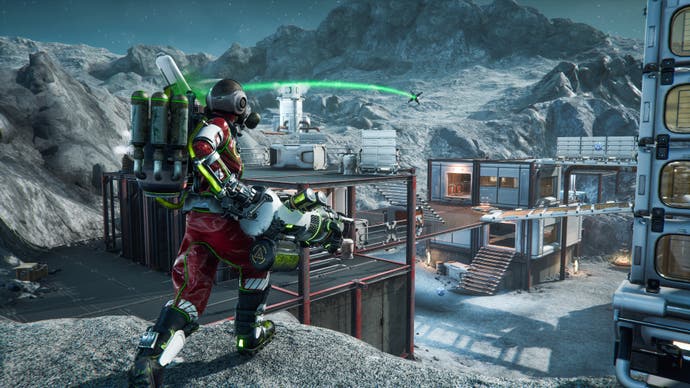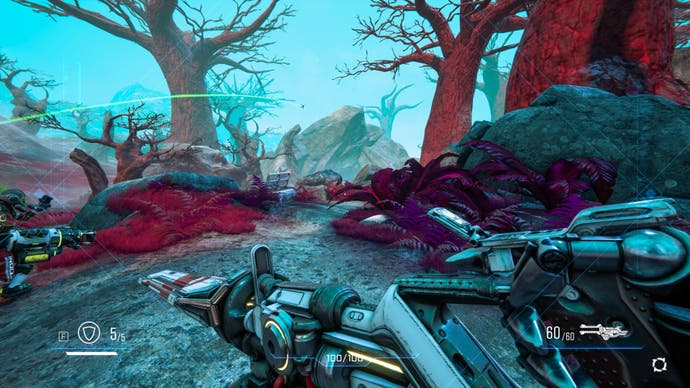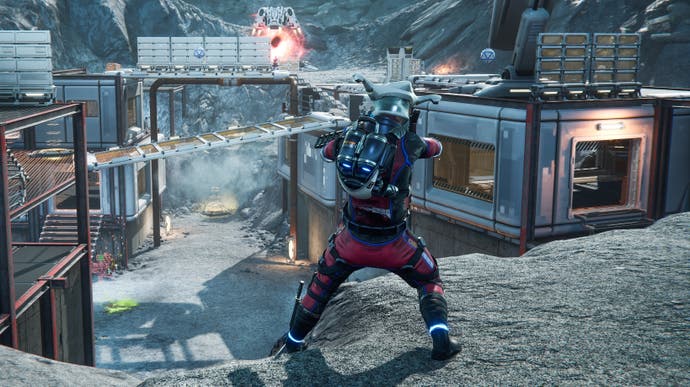Lemnis Gate is a tactical multiplayer FPS about manipulating 25-second time loops
Coming to Xbox One, PS4, and PC early next year.
If the old 'press button go bang' style of shooter is starting to wear you down, then you might be intrigued by newly announced Lemnis Gate. Created by Canadian studio Ratloop Games and released as part of Elite developer Frontier's new publishing initiative, it's a tactical turn-based first-person shooter built around a constantly repeating 25-second time loop.
Lemnis Gate unfolds at some unspecified point in the far-flung future, with humanity on the brink of extinction. In an attempt to postpone its fate, Earth has built a massive interstellar device which, once activated, will sling the planet back in time by 50 years. Unfortunately, a whole heap of parallel universes have had the same idea and are now engaged in battle to be the one to turn on the device and be the reality that survives.
Whether or not that dollop of scene-setting ultimately makes the slightest bit of sense is largely irrelevant. Once in-game, Lemnis Gate jettisons anything approaching a story to focus its attention on its competitive time-manipulating multiplayer skirmishes, where, each round, combatants take turns adding their characters to a 25-second time loop.
Any actions taken in that time, whether that be movement or the use of weapons and abilities, will repeat over and over until the end of the match, meaning players will effectively be able to fight alongside themselves in order to defeat their opponents.
Ratloop calls the resulting experience a game about "disrupting the past to change the future", where the goal is to "fix past mistakes, anticipate enemy movements, set traps to take them out". It's a distinctive approach for a shooter, and game director James Anderson offered some insight into Lemnis Gates' origin when I spoke to him during a recent Frontier showcase day.
"We wanted to create something that was a little bit different in the first-person shooter genre," he says, "So we took something that people know and love, which is an FPS..and we injected a twist and something that would fundamentally change...the moment to moment where you play, and particularly the way you think."

The rather more "unofficial" story behind Lemnis Gate, says Anderson, "is that I'm getting very old, and my reflexes aren't what they used to be. So we needed a way that we could use our brains to compensate for some of the skills that as older gamers may not exist anymore".
As such, admits Anderson, there's something of a learning curve, with new players tending to approach Lemnis Gate as a standard first-person shooter. Eventually, though, "there's this moment where you click and understand the way things happen is not always temporally coherent. So you could do something now that affects the game in three rounds."
It's not an easy concept to visualise, but Anderson shares a few potential situations by way of illustration. One of Lemnis Gate's five character classes has a deployable shield, "and that's something you can place in a specific location or you can place multiple of them in a location."

If another player then throws a grenade, it might hit the shield, cause splash damage, and, in a later round, destroy the player who threw it in the first place. "So it's...kind of like you can pre-place these objects in areas where you think your opponent might be a danger," explains Anderson, "And then later on a character might come in and be killed by one of your characters from a past round and it's immensely satisfying when that happens."
At launch, Lemnis Gate will support 1v1 and 2v2 matches, both online or through pass-the-controller local play - meaning you could technically battle against yourself if you really wanted to, but that might get a little weird. Additionally, it'll feature four game modes, each leaning heavily on classic FPS staples - Capture the Flag is the only mode Ratloop has revealed so far - in order to keep the core experience accessible and familiar, even with its temporal twist.
Quite how all this works in practice is impossible to say without some proper hands-on time, but there's undoubtedly an intriguing concept at play in Lemnis Gate. As such, it seems well worth keeping an eye on as its PC, PS4, and Xbox One launch in early 2021 approaches.


